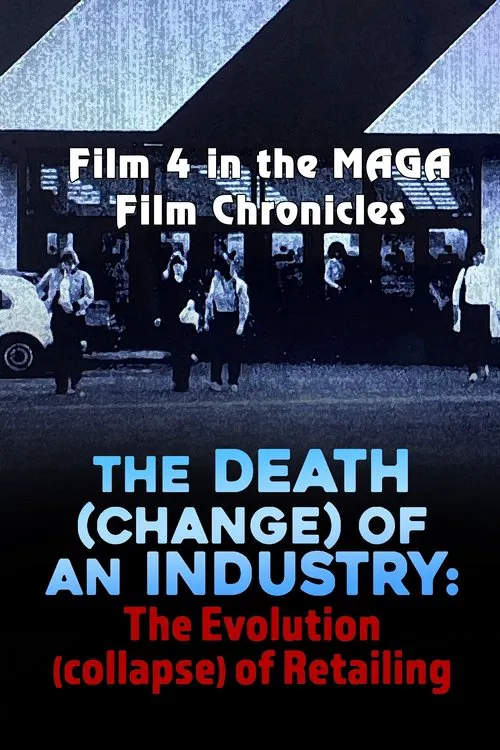The Death (Change) of an Industry: The Evolution (Collapse) of Retailing

Plot
The Death of an Industry, part of the MAGA film chronicles, takes an in-depth look at the rapidly shifting landscape of the retailing industry. Through poignant interviews with small business owners, financial analysts, and a seasoned retail executive from the same family who managed several significant department store chains across the United States, this film delves into the seismic changes that have reshaped the retail sector. As the narrative unfolds, we meet the retail executive, whose family was instrumental in the success of storied department stores like Bealls in Texas, PA Bergner in Illinois, and Venture department stores, a division of May Company based in St. Louis, Missouri. This family's history is intertwined with the retailing industry's transformation, and their candid insights provide a unique perspective on the industry's downfall. The film begins by highlighting the early signs of change, where the seeds of manufacturing's migration to overseas markets began to sow seeds of doubt about the industry's sustainability. As jobs disappeared and factories closed, American workers felt the pinch, and the once-thriving retailing sector began to lose its appeal. Consolidation became the buzzword, with smaller stores being swallowed up by larger chains, leading to further job losses and store closures. One of the key themes explored in the film is the distinction between "normal evolution of business" and the "death of something vital." Is the transformation of the retailing industry simply a natural progression of the market, or is it something more sinister – a symptom of the erosion of American middle-class jobs? This question hangs precariously in the air, with no easy answers. The film features a poignant interview with a small business owner who has lost their store to a larger chain. This individual's story serves as a powerful reminder of the human cost of the retailing industry's transformation. The small business owner shares their struggles to compete with the behemoths of the retailing world, where the same product can be purchased at a significantly lower price point, often with more convenient shopping hours and a wider selection. This narrative arc is replicated across the film, with several small business owners sharing their experiences of being pushed out of the market by larger, more competitive retailers. The film also examines the role of globalization in the retailing industry's demise. As manufacturing jobs moved overseas, companies were able to produce goods at a significantly lower cost, making it difficult for smaller retailers to compete on price. The loss of jobs in the manufacturing sector had a ripple effect throughout the economy, contributing to the decline of the retailing industry. Through the lens of this family's experiences, the film sheds light on the inner workings of the retailing industry and the factors that ultimately led to its decline. We learn about the pressure to remain competitive, the constant need to cut costs and increase efficiency, and the challenges of adapting to changing consumer behavior. This intimate perspective humanizes the retail industry, making it easier to empathize with the challenges faced by its workers and the consequences of its decline. In addition to exploring the human side of the retail industry's story, the film also ventures into the realm of economics and finance. We meet financial analysts who share their insights on the impact of globalization, technological changes, and shifting consumer behavior on the retailing industry's fortunes. These experts provide a detailed understanding of the complex financial and economic forces that have contributed to the industry's decline, creating a comprehensive portrait of the retailing sector's transformation. The Death of an Industry serves as a powerful commentary on the state of the American retailing sector. Through its thought-provoking interviews and insightful analysis, the film raises fundamental questions about the nature of business and industry in the United States. Is it possible for the retailing industry to reinvent itself, recapturing its status as a stalwart of American commerce? Or is the industry's decline a symptom of a broader issue, where American middle-class jobs are being systematically eroded? As the film concludes, one is left pondering the implications of the retailing industry's transformation. While the industry may have undergone a significant shift, the impact of this change is far-reaching and multifaceted. The film serves as a call to action, encouraging viewers to consider the implications of globalization, technological advancements, and shifting consumer behavior on the retailing sector and its workers. Ultimately, The Death of an Industry provides a nuanced and multifaceted exploration of a changing industry and the critical questions that come with it.
Reviews
Recommendations


